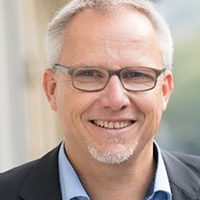Circumnavigating the world on a bike, Karsten Drath cycles another 3,500 km through North America
Since 2017, Karsten Drath has been cycling around the world to collect donations for the Cosmikk...
On resilience and changing careers following the Executive MBA
When speaking to executive MBA graduates, they often are the source of fascinating career paths and stories about their backgrounds and achievements. However, this is perhaps the first time an EMBA alum has opted to take on the challenge of cycling around the world in several consecutive trips to raise money for charity. Starting in 2017, Karsten Drath has cycled all around Europe from Gibraltar to the North Cape and from Lisbon to the Polish border. We speak to the alumnus of the Kellogg-WHU Executive MBA program, entrepreneur, founder, coach, and podcast host, about why he decided to embark on such an ambitious adventure.
“I want to inspire people to increase their resilience and their self-confidence. We have learned through years of research that these are muscles that can be trained. This challenge is less about sport or fitness than the mental strength to continue despite adversity. To fight against a blizzard, come out the other side, and feel better for it. 100% of the donations we raise during the challenge go to the Cosmikk Foundation which enables NGOs and social businesses with access to inexpensive coaching and organizational development so that they can thrive in their work. The beneficiaries of this year’s tour are the zis Foundation and local aid organization Dachzeltnomaden in the Ahr Valley (an area of Germany impacted by severe flooding in 2021). We believe organizations need such support to grow; money alone will not fix the world.”
Breaking the fundraising mission into several separate journeys, Karsten has just completed part of the North American leg of the tour. This took him 2,800 kilometers from the coastal region of Vancouver through the Rocky Mountains to the prairies of Saskatoon, bringing him close to dangerous flora and fauna, including bears, wolves, and cougars. “Surprisingly, the scariest thing in Canada is not the bears but truck drivers and thunderstorms,” he laughs.
An engineer by training, Karsten’s work ethic led him to be promoted to leadership positions early in his career. However, he found that despite his experience, he came from a technical perspective and often saw a disconnect between himself and upper management. “I wanted to better understand how to shape an organization and a team. I had a young family at the time and was working abroad, so I was looking for a part-time MBA to fit into my schedule. I also wanted a program with an international perspective as I worked in different countries for most of my career and knew the value of diverse perspectives. This is where the Kellogg-WHU Executive MBA ticked the boxes for me.”
Following the EMBA, Karsten led an international team within a large transportation company and then, in 2007, moved to IT giant Dell as a managing director. However, his most remarkable career move was in 2011, when he became an executive coach. “I enjoy working with people. In my leadership roles, I liked forming a team and overcoming obstacles or celebrating successes together. I didn’t know at the time what I was doing was part of coaching, but I was fascinated by the human aspect of it. I was in a well-paid, comfortable position with Dell, but I wanted to do what I loved. I had been in contact with Leadership Choices (an executive coaching consultancy), and the rest is history. I decided to become a psychotherapist, so I went back to school and worked in a clinic where I would help executives with PTSD, depression, or anxiety. While there, I wondered why I was here sitting as a therapist and why are they the patient? What makes us different? That’s what prompted my research into resilience.”
The most recent contribution of Leadership Choices was following catastrophic flooding in the Ahr Valley, a region in West Germany, in July 2021. “We (Leadership Choices) are 150 people based in 12 countries, so how can we contribute to their recovery? Of course, when your house has been flooded, you are not looking for coaching. We reached out to Dachzeltnomaden who were an aid organization already established helping people there. We joined as volunteers and helped working on the houses of flood victims. Over time, we developed a trusting relationship and were invited to run workshops for their leadership team, offer individual coaching, provide conflict mediation, and help with strategy. They are young both in age (average age of 30) and as a group, but they had already done incredible work to help survivors. From there, we could connect to local business owners and help them get back on their feet. This was the driving force for this fundraising tour.” In fact, this experience prompted the Cosmikk Foundation's founding to continue raising money for charities, NGOs, and social businesses.
Resilience is a term that could be used when describing the remaining population in the Ahr Valley, despite the tragedy, determined to rebuild their lives. However, Karsten is keen to point out that the term is often misused. “We should not mistake resilience for toughness,” he reflects. “It really means listening to yourself and understanding what you need. It’s about rest and recharging, whether psychologically, spiritually, or socially. It’s a change from the inside, not suppressing emotions or pretending to be okay, but using the resources around you so that you can emerge from the other side of adversity even stronger than before.”
If you want to support the fundraising project for the Cosmikk Foundation you can still do so with donations. Simply visit Karsten’s travel blog and look for the button “donate”.
Source: https://kellogg.whu.edu/en/magazin/kellogg-whu-executive-mba-program/around-the-world-by-bicycle-with-emba-alumnus-karsten-drath/

Since 2017, Karsten Drath has been cycling around the world to collect donations for the Cosmikk...

In March, our Managing Partner Karsten traveled to Kyiv, the capital of Ukraine, to...
Leave a Comment